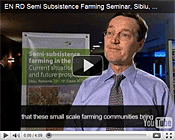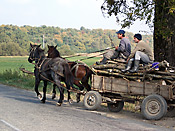Download
Programme: [PDF  ]
]
Details of Field Visits 15 October 2010 [PDF  ]
]
Background Paper
“Semi-subsistence farming in the EU: Current situation and future prospects” [PDF




 ]
]
Presentations
Plenary session - 13 October 2010
- Semi-subsistence farming, concepts and key issues
Sophia Davidova, Reader in European Agricultural Policy, University of Kent [PDF
 ]
]
- EU Rural Development (RD) Policy and semi-subsistence farming. What current RD tools are relevant for semi-subsistence farming and how are they being used? Antonis Constantinou, Director, Directorate General for Agriculture and Rural Development, European Commission [PDF
 ]
]
Workshops - 13 & 14 October 2010
Workshop1: Semi-subsistence farming concepts and key issues
- Presentation 1 The example of smallholders in Ireland, Jim Kinsella, University College Dublin, Ireland [PDF
 ]
]
- Presentation 2 Case study: semi-subsistence farming situation and policy - the example of Hungary
Csaba Forgacs Ass. Prof. Dr. habil., Corvinus University of Budapest, Hungary [PDF  ]
]
- Workshop discussion issues:[PDF
 ]
]
Workshop 2: Wider implications of semi-subsistence farming for society and the environment
- Presentation1 Agriculture and rural development in Romania, Mihail Dumitru [PDF
 ]
]
- Presentation2 Case study: semi-subsistence farming and the delivery of environmental benefits in Romania, Nathaniel Page, Director, ADEPT Foundation [PDF
 ]
]
- Presentation3 Structural change and social security: semi-subsistence farming in Bulgaria, Poland and Romania. Drawn from the outcomes of the S-Farm project, “Sustainability of semi-subsistence farming in new Member States and acceding countries”. Jana Fritzch, Senior Research Associate, IAMO, Germany [PDF
 ]
]
- Workshop discussion issues: [PDF
 ]
]
Workshop 3: Pathways for semi-subsistence farming: Integration into the food chain, diversification
- Presentation 1 Integration of semi-subsistence farming in the food supply chain – new opportunities or new barriers?, Liesbeth Dries, Agricultural Economics and Rural Policy Group, Wageningen University [PDF
 ]
]
- Presentation 2 Pathways for semi-subsistence farming from experience in EU15: strategies for diversifi cation, pluriactivity, ‘exit strategies’, Elena Saraceno, ENRD Contact Point [PDF
 ]
]
- Presentation 3 Increasing market participation: experience of Romanian Farmers’ Market “Targu Taranuliu”, Teodor Frolu, Association Group of initiative “ Radu Antu Roman” [PDF
 ]
]
- Workshop discussion issues: [PDF
 ]
]
Workshop 4: Reaching and supporting semi-subsistence farms
- Presentation 1 Evolution of policies for semi-subsistence farming in Poland, Jan Falkowski, Warsaw University, Poland [PDF
 ]
]
- Presentation 2 Case study, Crofting in Scotland: policies to address semi subsistence farms’ needs.Angus McHattie, Crofters commission, Isle of Skye, Scotland [PDF
 ]
]
- Workshop discussion issues: [PDF
 ]
]
Plenary session - 14 October 2010
- Report - Workshop1: Semi-subsistence farming concepts and key issues, Rapporteur: Tomas Ratinger, Independent consultant, Czech Republic [PDF
 ]
]
- Report - Workshop 2: Wider implications of semi-subsistence farming for society and the environment, Rapporteur: Gwyn Jones, Director, European Forum for Nature Conservation and Pastoralism [PDF
 ]
]
- Report – Workshop 3: Pathways for semi-subsistence farming: Integration into the food chain, diversifi cation, Rapporteur Michael Gregory, ENRD Contact Point [PDF
 ]
]
- Report - Workshop 4: Reaching and supporting semi-subsistence farms
Rapporteur: Yanka Kazakova, Independent consultant, Bulgaria [PDF  ]
]
- Presentation - Valeriu Tabără, Minister of Agriculture and Rural Development, Romania [PDF
 ]
]
- Speech of the Commissioner, Dacian Cioloş, European Commissioner for Agriculture and Rural Development. Click here.
Outcomes
Semi subsistence farming in the EU: current situation and future prospects: Summary report of outcomes [PDF
 ]
]
TThe seminar assessed the current situation and policies directed towards semi-subsistence farms across the EU, as well as their implications for the future. The main outcomes from the seminar highlighted:
-
The multi-functional and significant role of small and semi-subsistence farms as social safety nets in rural Europe; as suppliers of environmental services and other essential public goods; as contributors to the diversification of the rural economy; and as guardians of cultural traditions in rural areas;
-
Recognition that there is a wide variety of types of semi-subsistence farms throughout the EU, which require different types of support to meet their needs;
-
Acknowledgement of the need for a broader tool-kit of support measures to be developed, which better embrace the scale of diversity, in terms of farm types and needs within the EU. This is coupled with the need for greater coordination with other policy instruments locally, regionally and nationally to promote synergies and effectiveness, including further investment to improve the essential physical infrastructure in many rural areas;
-
The importance of making both current and future support more simple and accessible to all types of agricultural holdings, recognising the essential trade-off that has to be made between administrative requirements and practical delivery mechanisms;
-
The importance of supporting effective transfer of know-how, technical advisory services, targeted training programmes and the mobilisation of more locally-based initiatives, as some of the most effective mechanisms for ensuring a more inclusive approach to the development of subsistence and semi-subsistence farming, in Europe;
-
The important role that SSF can play in responding to the growing consumer demand for shortening the links between farm and fork and the potential importance of encouraging local farmer's markets to facilitate this process;











